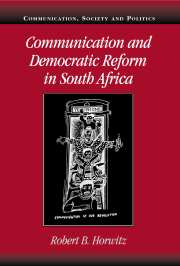Book contents
- Frontmatter
- Contents
- List of Tables
- Preface and Acknowledgments
- List of Acronyms and Abbreviations
- 1 Introduction and Overview
- 2 The Ancien Régime in the South African Communications Sector
- 3 “Sharing Power without Losing Control”: Reform Apartheid and the New Politics of Resistance
- 4 “Control Will Not Pass to Us”: The Reform Process in Broadcasting
- 5 “All Shall Call”: The Telecommunications Reform Process
- 6 Free but “Responsible”: The Battle over the Press and the Reform of the South African Communication Service
- 7 Conclusion: Black Economic Empowerment and Transformation
- Appendix
- References
- Index
2 - The Ancien Régime in the South African Communications Sector
Published online by Cambridge University Press: 04 December 2009
- Frontmatter
- Contents
- List of Tables
- Preface and Acknowledgments
- List of Acronyms and Abbreviations
- 1 Introduction and Overview
- 2 The Ancien Régime in the South African Communications Sector
- 3 “Sharing Power without Losing Control”: Reform Apartheid and the New Politics of Resistance
- 4 “Control Will Not Pass to Us”: The Reform Process in Broadcasting
- 5 “All Shall Call”: The Telecommunications Reform Process
- 6 Free but “Responsible”: The Battle over the Press and the Reform of the South African Communication Service
- 7 Conclusion: Black Economic Empowerment and Transformation
- Appendix
- References
- Index
Summary
The structures, functions, institutions, and political forces that constituted the ancien régime in the South African communications sector prior to 1990 only make sense within the political history of modern South Africa. The institutions of communication – the press, broadcasting, and telecommunications – were central to the evolution of the South African state and the apartheid system. The press gave voice and to some degree mediated the conflict between English- and Afrikaans-speaking communities; broadcasting, a product of tense compromises between the white groups, embodied the terms of their hegemonic alliance and expressed the ideological content of racial domination; state-owned and -operated telecommunications contributed importantly to the mechanisms that coordinated the apartheid economy.
White domination of the majority black population has pretty much been the rule since Dutch settlers arrived in the Cape peninsula in the latter half of the seventeenth century. Though serious hostility has always existed between Afrikaners, the descendants of the Dutch settlers, and the English (who began settling the territory after Britain seized the Cape in 1806 in order to protect its sea route to India), they essentially made common cause when it came to the domination of blacks and the use of black labor. This was particularly the case after diamonds and gold were discovered in the latter part of the nineteenth century. Mining changed the nature of the largely agriculture-oriented South African economy and society.
- Type
- Chapter
- Information
- Communication and Democratic Reform in South Africa , pp. 26 - 86Publisher: Cambridge University PressPrint publication year: 2001



